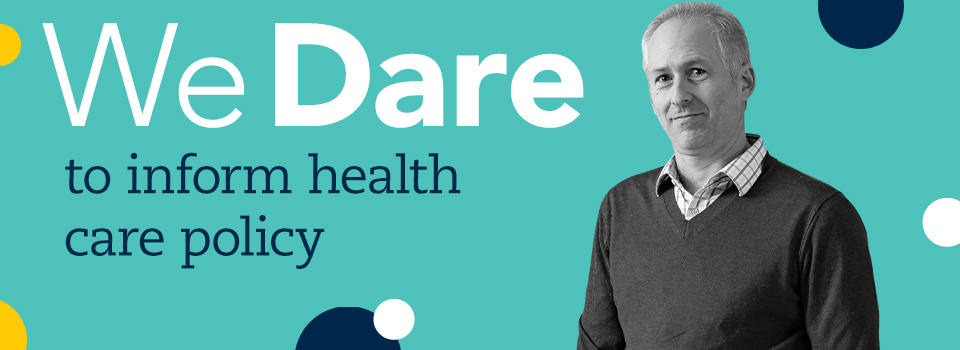We Dare to inform health care policy

How can we use research to reshape policy and transform the way we care for vulnerable populations?
Most adults ages 65 and older rely on Medicare. This population is living longer than ever before, and doing so with more chronic illness and functional limitations. Assistant Professor Geoffrey Hoffman, Ph.D., MPH, is using his research on falls, caregiving and hospital readmissions to push for policy change and rethink the way we provide care to older adults.
Hoffman’s analyses show systemic concerns. He estimates that Medicare spends $10 to $20 billion per year on falls, and current Medicare policies can contribute to a revolving door of hospital readmissions. His research revealed that readmissions have causes that reflect gaps in non-medical support for vulnerable older adults, including risk of fall injury, health care-acquired infection and lack of caregiver support.
In people 65 or older, fall-related injuries within a month of discharge ranked as the third leading diagnosis for readmission. The risk was greater for patients already deemed fall risks, or who were discharged to their homes or home health care.
“Falls are a good signal of how well we treat people over the continuum because they reflect a decline in functional status,” Hoffman said.
Hoffman’s research has also revealed that a disproportionately high number of older adult patients are readmitted for preexisting or linked infections presumably treated during their first hospital stay. Patients discharged home or to home care were 38 percent more likely to return with a linked infection than those discharged to skilled nursing homes.
“This suggests home health care agencies aren’t up to snuff with infection control, and patients going home without home health care probably need better training,” Hoffman said.
By changing the model to focus on personalized prevention, including patient and family education and discharge to settings that provide effective rehabilitation and post-hospital care, Hoffman believes we can improve patient recovery and mobility while minimizing costs. Informed by his time with the Congressional Research Service, he understands that policy is a critically important mechanism to improving quality of care for older adults and their subsequent health outcomes.
“We need to reach people before they get into the hospital, and shifting funding from medicalization to prevention could be extremely important,” Hoffman explained. “There’s also a gap in our health care system. We need policies that better address post-hospital rehabilitation as well as long-term care needs for older adults.”
Through complex data analysis, Hoffman’s work provides new information that benefits those who write policies and the frontline health care leaders who implement them. He is at the U-M School of Nursing, in part, because he recognizes that nurses are essential to the future of effective health policy, especially with an aging population.
“Many of the solutions to our policy problems rely on the holistic care nurses provide. When we consider the most effective programs for improving patient care, we’re counting on nurses to deliver them.”
“Many of the solutions to our policy problems rely on the holistic care nurses provide. When we consider the most effective programs for improving patient care, we’re counting on nurses to deliver them.”
— Geoffrey Hoffman, Ph.D., MPH
Assistant Professor






